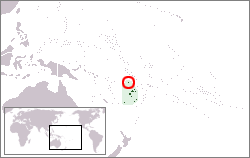Republic of Rotuma | |||||||||
|---|---|---|---|---|---|---|---|---|---|
| 1987–1988 | |||||||||
Flag | |||||||||
 | |||||||||
| Common languages | Rotuman | ||||||||
| King | |||||||||
• 1987–1988 | Henry Gibson | ||||||||
| History | |||||||||
• Established | 1987 | ||||||||
• Disestablished | 1988 | ||||||||
| |||||||||
| Today part of | Fiji | ||||||||
The Republic of Rotuma was an unrealized [1] [2] attempt at creating an independent Rotuma starting in September 1987 after the second Fijian coup. A part-Rotuman man named Henry Gibson announced to the New Zealand newspapers that he had declared the independence of Rotuma from Fiji. Gibson proclaimed himself the King of Rotuma and gained a popular following on the island. Aims to create the republic were aborted in 1988, when advocates were tried with sedition. [3]
